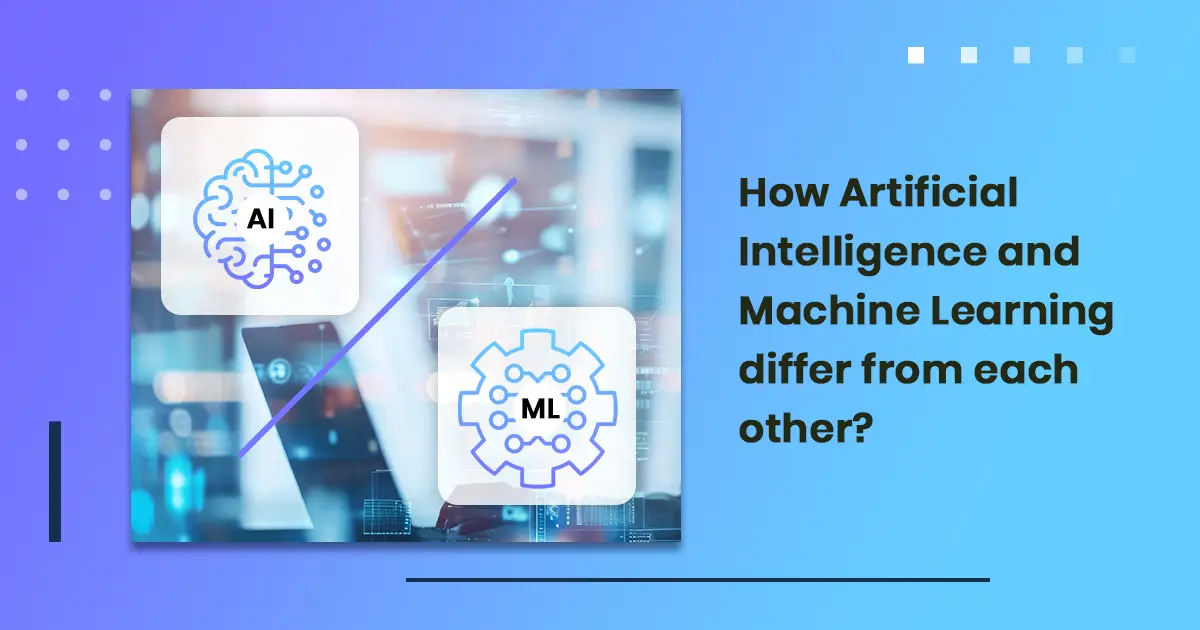
How Artificial Intelligence and Machine Learning differ from each other?
Dec 29, 2023
Technology field’s most common terms in usage today are ‘Artificial Intelligence’ and ‘Machine Learning’. Many industries implementing or going to implement AI or ML in their business practises use these words interchangeably. Let us look at their meanings and differences.
What is Artificial Intelligence?
According to Andrew Moore, former Dean at Carnegie Mellon University, “Artificial intelligence is the science and engineering of making computers behave in ways that, until recently, we thought required human intelligence.” So, it is a machine, given the thinking prowess of human beings.
Artificial Intelligence method does not rely on pre-programming. The package already consists of a subsection of machine learning algorithms such as reinforcement learning algorithms and neural networks for deep learning for defining its tasks.
Artificial intelligence, impacts on daily lives through entertainment channels like Netflix and Amazon, communication gadgets like Alexa, Siri etc.
What is Machine Learning?
According to Tom M. Mitchell: “Machine learning is the study of computer algorithms that allow computer programs to automatically improve through experience.”
Machine Learning is a subset of AI, and for functioning it relies on past or present structured data to seek common patterns and give reasonable conclusions from the defined data. Therefore, ML helps in decision making using historical data without being programmed. The data it feeds as input needs to be either in the format of structured or semi-structured, for giving predictions based on the data. We can see the usage of ML for recommendations in websites based on our historical data like suggesting books, films, etc.
We are now familiar with these two terms, in order to gain more information, let us find out how they are different from each other.
Also read: How can Artificial Intelligence compliment the CFO's role?
What are the differences between AI and ML
- Scope and objective:
Artificial intelligence is a technology invented to inherit human skills and capabilities to solve complex problems like and beyond human rationality. It emphasises on performing tasks at par with human potential. AI has a broader range of scope to encompass many subsections in its domain. Machine learning is a technology invented to allow machines to just learn from the input data and reach logical conclusions. The task entrusted is to perform just that particular task and give the best result. ML has a refined and limited scope. - Learning skills:
Artificial Intelligence technology learns its skills through observing and imitating human behaviour. AI has two main subsets namely, Machine Learning and Deep Learning. Machine Learning gives access to machines to learn through the input data. At the initial stage, ML is taught, sooner, they learn from both the historical and recent input data and draw best conclusions from the feed data. Machine Learning has Deep learning as its sub-set. - Data feed:
Artificial Intelligence absorbs data from various sources in forms of structured, semi-structured and unstructured data for making hypotheses and predictions. Machine Learning - is very particular about the input data for predictions, it relies heavily on structured and semi-structured data. - Techniques employed:
Artificial Intelligence includes the techniques of learning, reasoning, self evaluation and corrective actions. So, they are trained to handle various complex tasks that even humans cannot envision. Machine Learning includes techniques of learning and evaluating from the historical and new data. Further, they are trained only for executing those specified tasks. - Types of functionality:
Artificial Intelligence is categorized into three types namely, Weak AI, Strong AI and General AI. Through these capabilities they capitalize on maximising their success rate. Machine Learning is categorized into three types namely Supervised ML, Unsupervised ML and Reinforcement ML. Through these capabilities they concentrate only on the accuracy and pattern recognition. - Applications:
The familiar applications that use AI are Siri, Alexa, online games, customer support using chatbots etc. The familiar applications that use ML are online recommendations for books, clothing, movies etc from our historical preferences, Email spam, Facebook common friends, linking suggestions etc.
With these differences in place, both AI and ML are quite popular in their own ways and used by all industries for different purposes. Over the years, gradually both have penetrated human thinking and started getting wider acceptance.
If you are thinking about using either Artificial Intelligence and Machine Learning at your organisations, contact us.
Schedule Your Free Demo
With our accounting automation experts
Find out how other practices have benefited using Integra Balance AI bookkeeping automation. 87% of practices who viewed AI bots in action have instantly discovered the advantages of using them at their firm.
Global Offices
US (Head Quarters)
Integra Global Solutions Corp
7500 Brooktree Road, Suite 100
Wexford (Pittsburgh)
PA 15090
+1 412 267 1529
Philippines
Integra Global Solutions Corp
Ayala Cebu Tower,
Cebu Business park, Cebu 6000
+1 412 267 1529
Europe
Integra Global Solutions UK Ltd
College House
17 King Edwards Road
Ruislip, London, UK, HA4 7AE
+44 (0)20 7993 2949
Canada
Integra Global Solutions Corp
32 Blencathra Hill, Unit 100, Markham
Ontario
+1 412 267 1529
India
Integra Global Solutions Corp
First floor, Kanapathy Towers,
Opp.BSNL exchange, Ganapathy,
Coimbatore – 641 006, India
+91 (0422) 437 9555
Australia
Integra Global Solutions Corp
+61 02 8005 1836
